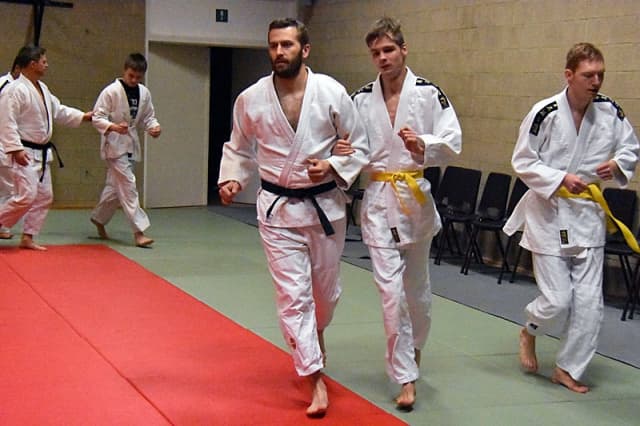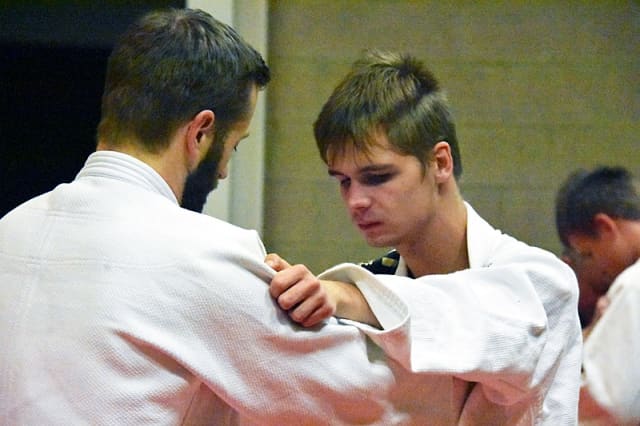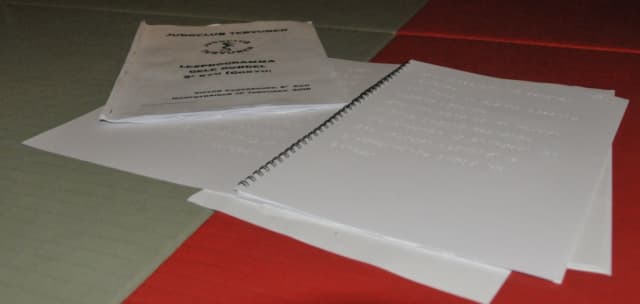Louis Braille is barely 3 years old when he becomes blind. At the age of 16 he develops a spelling in embossment that allows blind people to read and write. Braille writing has been used worldwide and in all languages to date, both for texts and for mathematics or music. Numerous objects or devices (timepieces, board games, measuring equipment, elevators, computers etc.) can be adapted for use by blind persons thanks to the braille.
Visual Impaired Judo As a result of this World Braille Day, we would like to shine the spotlight on judokas with a visual limitation worldwide. For this purpose, a member of the IJF media team recently visited a specific Visual Impaired judo (VI Judo) training. And yes, also on this tatami business as usual: throws, leg sweeps, waza-aris and ippons!
After all, judo is an extremely suitable sport for people with a visual impairment. Judo is a contact sport. You can very well feel which technique your opponent wants to apply and anticipate. People with a visual impairment can practice judo sport according to the VI judo regulations, in which all techniques from regular judo are allowed, also arm clips, leg sweeps etc. A difference with the regular judo is that in a VI judo competition both judokas always start with a standard judo grab of each other’s judogi.
At JC Tervuren, a club at the outskirts of the Belgian capital Brussels, the club has been offering VI judo for several years now. "We started VI Judo about four years ago at the request of Centrum Ganspoel from Huldenberg," explains Jan Camelbeek, youth coordinator of JC Tervuren. "Ganspoel is an institution that works with pupils with a visual and/or visual multiple limitation."
How did the judo club handle this? "At the request of Ganspoel we started looking at how we could help", says Jan Camelbeek. "The visual impairment among these young people also has an impact on coordination and motoric skills. That is why it was difficult to integrate them into regular training. So, we set up a separate training group. And we always try to use one coach per participant. To run together during warm-up, to be able to do elementary exercises together, but also for throws etc. For the rest it is basically the regular judo program," says Jan Camelbeek. "Some of our visual impaired judokas have already achieved a yellow belt. That's the regular yellow belt program of the federation - the theory book was translated into braille writing! The only difference is during randori, they start from holding each other's judogi. We try to keep it as traditional as possible. VI Judo is very tactile in that sense. Many exercises also start with each other. We work with both completely blind judokas and visually impaired judokas.”
Motivated The VI judokas are very enthusiastic. "These youngsters enjoy their membership at the judo club," says Susy Gijbels, supervisor at Centrum Ganspoel. "From the first year on we saw the sense of self-esteem among these young people rising by the week. That was wonderful to witness. Their self-development is enormous. They are proud of themselves. Some already have a yellow belt. In this way, they participate in normal life. And that makes everyone happy. Moreover, they always look forward to the training. We must never motivate them. It is always with full conviction that they come to the dojo. Of course, they have fantastic coaches. When we partnered with the judo club, we invited the coaches for a small training. They all participated, in the evening during their free time, to learn how to guide our youngsters."
"I think Judo is a super fun sport", says Key, one of the visual impaired judokas. "I can also enjoy it every week. I also have a good coach who gives me excellent guidance in all exercises." Meanwhile, Key has a yellow belt. "That does indeed mean something. I've already grown a bit in the sport and hopefully I can continue to evolve."
"This is great! This also gives a lot of satisfaction as a coach", says Ronald De Groot. "Key’s yellow belt is well deserved. Key really has talent. He works hard and is always motivated on the tatami. It is always pleasant to work with him.”
A well-known an and reputed visual impaired judoka is Ilham Zakiyev (three Paralympic medals including two gold, two world titles and a vast collection of European titles), inducted into the IJF Hall of Fame at the 2018 Worlds in Baku.
More information about visualy impaired judo: http://www.ibsasport.org/ News related: https://www.ijf.org/news/show/ijf-ibsa-renew-MoU-to-further-promote-judo




